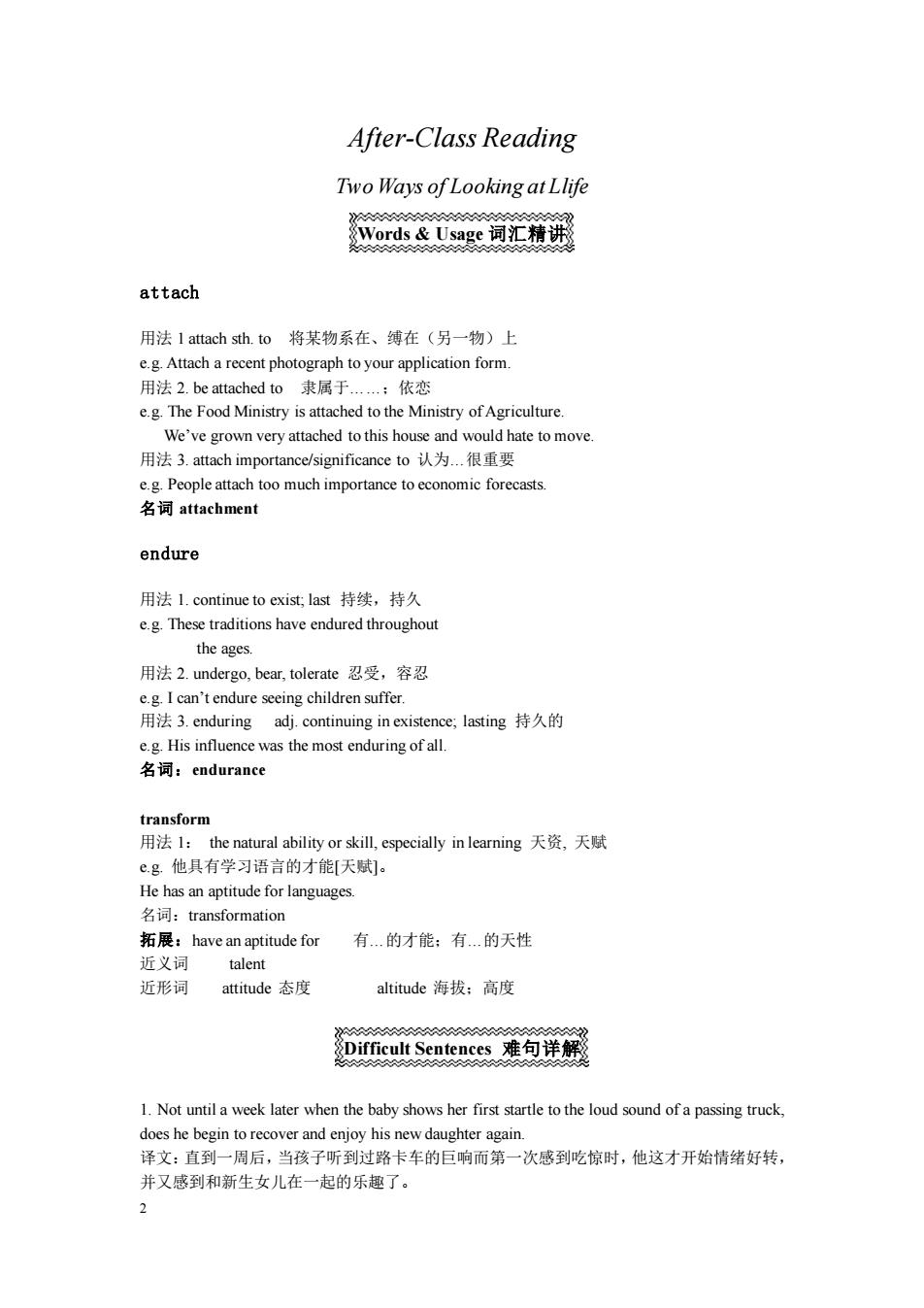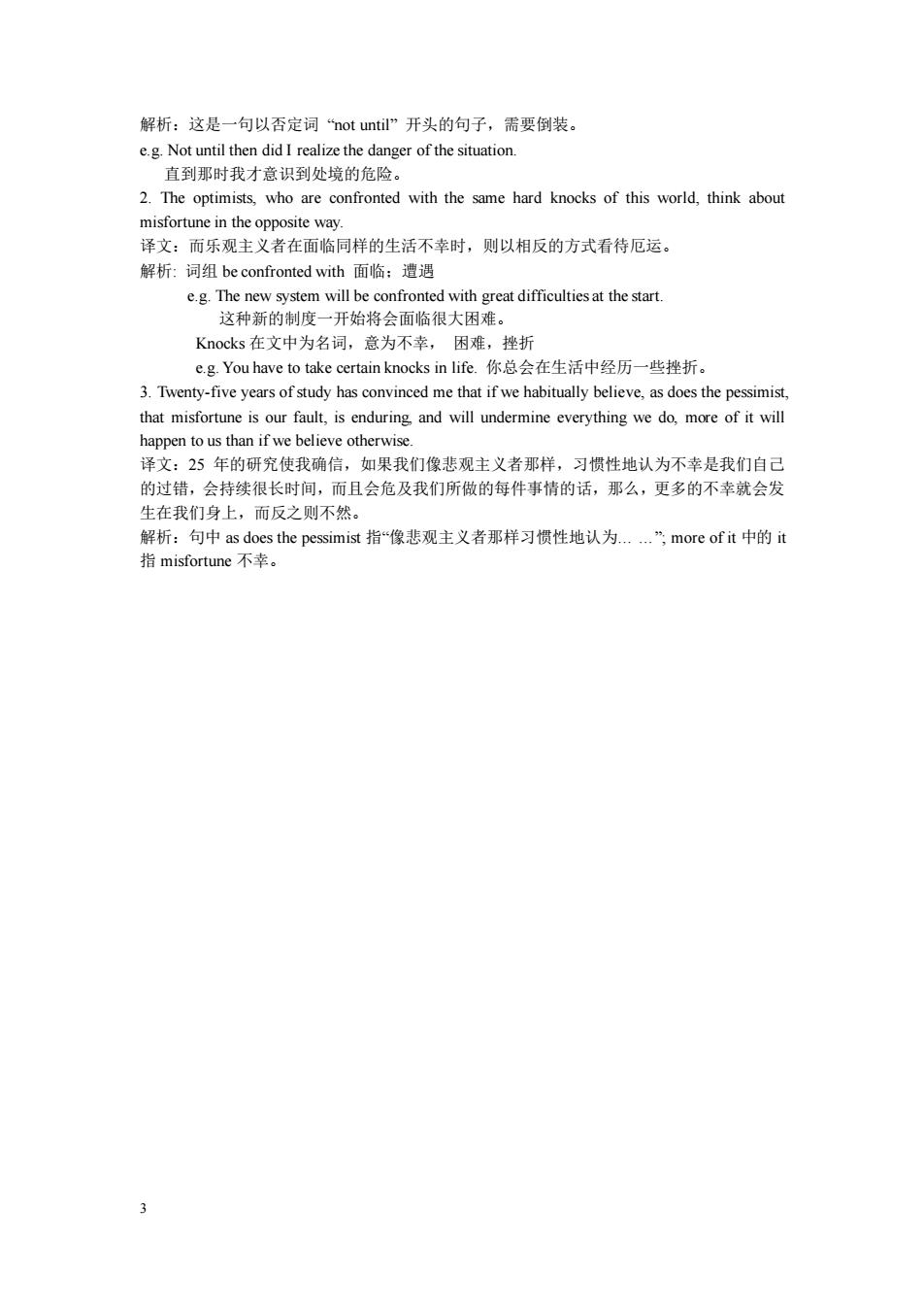
Unit 1 Personality In-Class Reading The Misery ofShyness S你y Words&Usage词汇精进多 acquaintance 用法l:Knowledge of a person acquired by a relationship less intimate than friendship.相识的人 用法2:A person whom one knows.熟人 用法3:Knowledge or information about something or someone认识:认知 拓展词组: a passing acquaintance with对.的浮浅的了解 drop/cut sb's acquaintance(=cut an acquaintance with sb)和某人绝交 have a nodding/bowing acquaintance with sb与某人有点头之交,(对某学科)略知一二 have no acquaintance with不熟悉,不了解 make the acquaintance of sb.(=make sb..'s acquaintance)结识某人 pick acquaintance with偶然结识/认识 upon(further)acquaintance经过一段(较长)时期的熟悉/了解 inferior 用法:adj.次要的,低等的,低下的 拓展词组:be inferior to在..之下;次于;不如 besb.'s inferior in在..方面不及某人 inferior by comparison相形见绌 反义词:superior 分ifficult Sentences难句详解暖 1.Shy people are anxious and self-conscious,that is,they are excessively concerned with their own appearance and actions. 译文:羞怯的人会焦虑不安,感到不自然;也就是说,他们过分地关注自己的外表和举止。 Shy people are worried about and aware of themselves;that is,they pay too much to their appearance and actions. 拓展:其它前缀为self的常用表达:self-assurance,self-esteem,self-worth,self-conscious,. self-concept,self-confident,self-awareness,self-destructive,self-acceptance,self-rejection,etc. 2.For instance,people who have a positive sense of self-worth or high self-esteem usually act with confidence. 译文:例如,具有积极的自我价值观或很强自尊心的人往往表现出自信。 For instance,people who are quite sure about and respect themselves usually act confidently
1 Unit 1 Personality In-Class Reading The Misery of Shyness Words & Usage 词汇精讲 acquaintance 用法 1:Knowledge of a person acquired by a relationship less intimate than friendship. 相识的人 用法 2: A person whom one knows. 熟人 用法 3:Knowledge or information about something or someone 认识;认知 拓展词组: a passing acquaintance with 对...的浮浅的了解 drop /cut sb's acquaintance (=cut an acquaintance with sb)和某人绝交 have a nodding /bowing acquaintance with sb 与某人有点头之交; (对某学科)略知一二 have no acquaintance with 不熟悉, 不了解 make the acquaintance of sb. (=make sb.'s acquaintance)结识某人 pick acquaintance with 偶然结识/认识 upon (further) acquaintance 经过一段(较长)时期的熟悉/了解 inferior 用法:adj. 次要的,低等的,低下的 拓展词组:be inferior to 在....之下; 次于; 不如 be sb.'s inferior in 在....方面不及某人 inferior by comparison 相形见绌 反义词:superior Difficult Sentences 难句详解 1. Shy people are anxious and self-conscious; that is, they are excessively concerned with their own appearance and actions. 译文:羞怯的人会焦虑不安,感到不自然;也就是说,他们过分地关注自己的外表和举止。 释义:Shy people are worried about and aware of themselves; that is, they pay too much to their appearance and actions. 拓展:其它前缀为 self-的常用表达:self-assurance, self-esteem, self-worth, self-conscious, self-concept, self-confident, self-awareness, self-destructive, self-acceptance, self-rejection, etc. 2. For instance, people who have a positive sense of self-worth or high self-esteem usually act with confidence. 译文:例如,具有积极的自我价值观或很强自尊心的人往往表现出自信。 释义:For instance, people who are quite sure about and respect themselves usually act confidently

After-Class Reading Two Ways of Looking at Llife 》 Words&Usage词汇精进 attach 用法1 attach sth.to将某物系在、缚在(另一物)上 e.g.Attach a recent photograph to your application form. 用法2.be attached to隶属于...:依恋 e.g.The Food Ministry is attached to the Ministry of Agriculture. We've grown very attached to this house and would hate to move. 用法3.attach importance/significance to认为.很重要 e.g.People attach too much importance to economic forecasts. 名词attachment endure 用法l.continue to exist,.last持续,持久 e.g.These traditions have endured throughout the ages. 用法2.undergo,bear,tolerate忍受,容忍 e.g.I can't endure seeing children suffer. 用法3.enduring adj.continuing in existence,lasting持久的 e.g.His influence was the most enduring of all. 名词:endurance transform 用法l:the natural ability or skill,especially in learning天资,天赋 e.g.他具有学习语言的才能[天赋]。 He has an aptitude for languages. 名词:transformation 拓展:have an aptitude for 有..的才能;有的天性 近义词 talent 近形词 attitude态度 altitude海拔;高度 28 Difficult Sentences难句详解影 R 1.Not until a week later when the baby shows her first startle to the loud sound of a passing truck, does he begin to recover and enjoy his new daughter again. 译文:直到一周后,当孩子听到过路卡车的巨响而第一次感到吃惊时,他这才开始情绪好转, 并又感到和新生女儿在一起的乐趣了。 2
2 After-Class Reading Two Ways of Looking at Llife Words & Usage 词汇精讲 attach 用法 1 attach sth. to 将某物系在、缚在(另一物)上 e.g. Attach a recent photograph to your application form. 用法 2. be attached to 隶属于……;依恋 e.g. The Food Ministry is attached to the Ministry of Agriculture. We’ve grown very attached to this house and would hate to move. 用法 3. attach importance/significance to 认为…很重要 e.g. People attach too much importance to economic forecasts. 名词 attachment endure 用法 1. continue to exist; last 持续,持久 e.g. These traditions have endured throughout the ages. 用法 2. undergo, bear, tolerate 忍受,容忍 e.g. I can’t endure seeing children suffer. 用法 3. enduring adj. continuing in existence; lasting 持久的 e.g. His influence was the most enduring of all. 名词:endurance transform 用法 1: the natural ability or skill, especially in learning 天资, 天赋 e.g. 他具有学习语言的才能[天赋]。 He has an aptitude for languages. 名词:transformation 拓展:have an aptitude for 有…的才能;有…的天性 近义词 talent 近形词 attitude 态度 altitude 海拔;高度 Difficult Sentences 难句详解 1. Not until a week later when the baby shows her first startle to the loud sound of a passing truck, does he begin to recover and enjoy his new daughter again. 译文:直到一周后,当孩子听到过路卡车的巨响而第一次感到吃惊时,他这才开始情绪好转, 并又感到和新生女儿在一起的乐趣了

解析:这是一句以否定词“not until'”开头的句子,需要倒装。 e.g.Not until then did I realize the danger of the situation. 直到那时我才意识到处境的危险。 2.The optimists,who are confronted with the same hard knocks of this world,think about misfortune in the opposite way. 译文:而乐观主义者在面临同样的生活不幸时,则以相反的方式看待厄运。 解析:词组be confronted with面临;遭遇 e.g.The new system will be confronted with great difficulties at the start. 这种新的制度一开始将会面临很大困难。 Knocks在文中为名词,意为不幸,困难,挫折 e.g.You have to take certain knocks in life..你总会在生活中经历一些挫折。 3.Twenty-five years of study has convinced me that if we habitually believe,as does the pessimist, that misfortune is our fault,is enduring and will undermine everything we do,more of it will happen to us than if we believe otherwise. 译文:25年的研究使我确信,如果我们像悲观主义者那样,习惯性地认为不幸是我们自己 的过错,会持续很长时间,而且会危及我们所做的每件事情的话,那么,更多的不幸就会发 生在我们身上,而反之则不然。 解析:句中as does the pessimist指“像悲观主义者那样习惯性地认为.”,more of it中的it 指misfortune不幸。 3
3 解析:这是一句以否定词 “not until” 开头的句子,需要倒装。 e.g. Not until then did I realize the danger of the situation. 直到那时我才意识到处境的危险。 2. The optimists, who are confronted with the same hard knocks of this world, think about misfortune in the opposite way. 译文:而乐观主义者在面临同样的生活不幸时,则以相反的方式看待厄运。 解析: 词组 be confronted with 面临;遭遇 e.g. The new system will be confronted with great difficulties at the start. 这种新的制度一开始将会面临很大困难。 Knocks 在文中为名词,意为不幸, 困难,挫折 e.g. You have to take certain knocks in life. 你总会在生活中经历一些挫折。 3. Twenty-five years of study has convinced me that if we habitually believe, as does the pessimist, that misfortune is our fault, is enduring, and will undermine everything we do, more of it will happen to us than if we believe otherwise. 译文:25 年的研究使我确信,如果我们像悲观主义者那样,习惯性地认为不幸是我们自己 的过错,会持续很长时间,而且会危及我们所做的每件事情的话,那么,更多的不幸就会发 生在我们身上,而反之则不然。 解析:句中 as does the pessimist 指“像悲观主义者那样习惯性地认为… …”; more of it 中的 it 指 misfortune 不幸